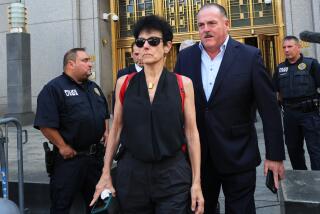Fidelity’s Johnson Clan Meets With Regulators
- Share via
Fidelity Investments’ family owners recently met with financial regulators as the government probes whether gifts were exchanged for business at the world’s biggest mutual fund company, according to a published report Tuesday.
The Wall Street Journal, citing people familiar with the matter, said the Securities and Exchange Commission was looking into tickets that Fidelity Chairman Edward Johnson and his wife accepted from a Wall Street firm to attend a skating event at the 2002 Winter Olympics.
Fidelity spokeswoman Anne Crowley declined to comment on the matter directly because the investigation is continuing, but said the firm believed that business entertainment served a legitimate business purpose.
Regulators also are reviewing the role Abigail Johnson, the couple’s daughter -- who owns the single biggest stake in the privately held company and now heads the firm’s retirement-services business -- played in securing the tickets.
Crowley said Edward Johnson and Abigail Johnson had spoken with regulators. “When the investigation is concluded we will certainly discuss this and other allegations,” she said.
Boston-based Fidelity, which invests more than $1.1 trillion in assets, has avoided the industry’s recent scandals involving after-hours trading and other abuses. But the company last year disciplined more than a dozen employees as a probe into gift-giving practices at brokerages picked up speed.
The U.S. attorney in Boston also is investigating the matter, looking into whether traders at Fidelity doled out trading business in exchange for drugs and prostitutes, people familiar with the matter said, according to the Journal.
The newspaper said it was unclear who paid for the tickets the Johnsons got, or whether they knew the tickets came from a brokerage. It is also unclear what rules, if any, the couple may have violated, the Journal said. The inquiry is preliminary, it said.
Fund regulators have become more sensitive to perceived conflicts of interest in the industry, in the wake of the industry’s scandals since 2003.
More to Read
Inside the business of entertainment
The Wide Shot brings you news, analysis and insights on everything from streaming wars to production — and what it all means for the future.
You may occasionally receive promotional content from the Los Angeles Times.










